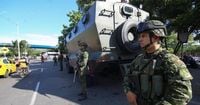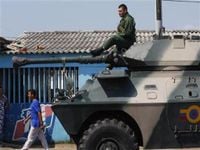In a move that has sent shockwaves through Latin American diplomacy, the United States decertified Colombia as a cooperative partner in the war on drugs on September 15, 2025. The decision, announced by President Donald Trump, marks the first time in nearly three decades that Colombia—a key US ally in the region—has been officially delisted as a reliable anti-narcotics partner. The fallout has been swift and multifaceted, exposing deep rifts within Colombia’s political landscape and threatening to reshape the longstanding security alliance between Washington and Bogotá.
According to Al Jazeera and The Conversation, the US action was justified by a dramatic surge in coca cultivation and cocaine production in Colombia. The United Nations Office on Drugs and Crime (UNODC) reported that by 2023, coca cultivation in Colombia had nearly tripled to 253,000 hectares, with the nation now responsible for 67% of global cocaine output—a figure six times higher than in 1993, the year Pablo Escobar was killed. President Trump accused his Colombian counterpart, Gustavo Petro, of overseeing a rise in cocaine production to “all-time records” and declared that Colombia had “failed demonstrably to meet its drug control obligations.”
Yet, the US decision stopped short of imposing the harsh sanctions that typically accompany decertification. Instead, it delivered a stinging symbolic rebuke and signaled that American support for Colombia is no longer unconditional. As The Conversation noted, the move “marks a rupture in one of Washington’s longest-standing security partnerships in the region.”
The response from Colombia was immediate and dramatic. On September 16, 2025, Interior Minister Armando Benedetti announced on Blu Radio that “from this moment on...weapons will not be purchased from the United States.” This suspension of arms purchases, while largely symbolic in the short term, underscores the depth of Colombia’s frustration. Army Commander Francisco Cubides assured the public that Colombia would continue to “disrupt the drug trafficking chain” with or without American support, emphasizing national resolve in the face of shifting alliances.
President Petro, a former leftist guerrilla who took office in 2022, has championed a radical shift in anti-narcotics strategy. Rejecting decades of militarized crackdowns and forced eradication, his administration has focused on negotiated transitions, voluntary crop substitution, and rural development—policies he argues address the root causes of the drug trade: poverty, inequality, and state absence. Petro has resisted calls to resume controversial aerial spraying of coca fields with glyphosate, which Colombian courts suspended in 2015 due to environmental and health concerns.
Petro’s critics, especially in the US and among Colombia’s political opposition, see these policies as dangerously permissive. US Secretary of State Marco Rubio, a longtime critic of leftist leaders in Latin America, remarked during a visit to Israel, “Colombia has been a great partner historically. Unfortunately, they have a president now that, in addition to being erratic, has not been a very good partner when it comes to taking on the drug cartels.”
Political tensions within Colombia have also intensified. Coalition senator and presidential candidate Ivan Cepeda lashed out at what he called the US’s double standards: “This is a political decision that reflects, once again, the double standards of those in power when faced with a global problem. While drug use continues to grow, drug trafficking profits flow into their financial systems, and transnational crime networks grow stronger, Colombia continues to pay the highest price: thousands of lives lost, billions in public resources squandered, and profound institutional degradation. And yet, we are blamed for a failure for which the party most responsible is precisely the one who designed and imposed this strategy.”
Meanwhile, eleven opposition parties issued a joint statement blaming Petro for the diplomatic fallout. “The executive branch’s statements do not reflect the country’s position and constitute an insult to a nation that has supported Colombia in this effort for decades,” they declared, rejecting Petro’s confrontational posture toward the Trump administration.
The timing of the US move has fueled speculation about broader motives. Petro accused Washington of trying to “participate” in Colombia’s domestic politics ahead of the 2026 elections and seeking a “puppet president.” He has often clashed with Trump, notably over extradition requests and US actions in Venezuela. On social media, Petro defended his record, claiming that Colombia had seized more cocaine under his administration than previous governments, and argued that the real problem lies in global demand. “The world needs to change its anti-drug policy because it has failed,” he wrote, adding, “cocaine consumption in the United States had only stabilized because they switched en masse to fentanyl consumption, which is 30 times more deadly.”
Behind the scenes, Washington’s frustration extends beyond drug policy. US officials have quietly criticized Petro for slowing or conditioning the extradition of traffickers, warming ties with Venezuela and China, and displaying skepticism toward US-led security initiatives. These shifts have raised doubts about Colombia’s long-term alignment with American strategy in the hemisphere.
For Colombia, the stakes are high. US assistance for anti-narcotics efforts amounts to roughly $380 million a year, and while the Trump administration has signaled that national interest waivers will allow some aid to continue, the country’s reputation with investors and multilateral lenders has been damaged. As The Conversation observed, “It also injects mistrust into a diplomatic relationship that has long underpinned US security strategies in Latin America.”
On the ground, the challenges are acute. The Colombian military and police are still reeling from a series of deadly attacks by guerrilla groups. On August 21, 2025, twelve police officers were killed when breakaway members of the defunct FARC rebel group shot down a police helicopter during a coca eradication operation. Coca cultivation has also expanded into protected areas, including national parks, raising environmental alarms.
Petro now faces a delicate balancing act. Yielding to US demands for more aggressive eradication could alienate coca-growing communities and undermine his peace-building agenda. But resisting external pressure risks further isolation and domestic political backlash. Civil society groups warn that resuming aerial fumigation could spark protests and harm both health and ecosystems.
Ultimately, the decertification episode highlights just how far apart the US and Colombia have drifted in their approaches to the drug war. Washington’s decision reflects both acute frustration and a calculated effort to regain leverage, while Petro’s government insists that a paradigm shift is necessary to address the complex realities of the cocaine economy. The coming months will test whether compromise is possible—or whether this rupture will define a new era in US-Colombia relations.
As both nations navigate this fraught moment, the choices they make could reverberate well beyond the Andes, shaping the future of anti-narcotics cooperation and regional diplomacy for years to come.


